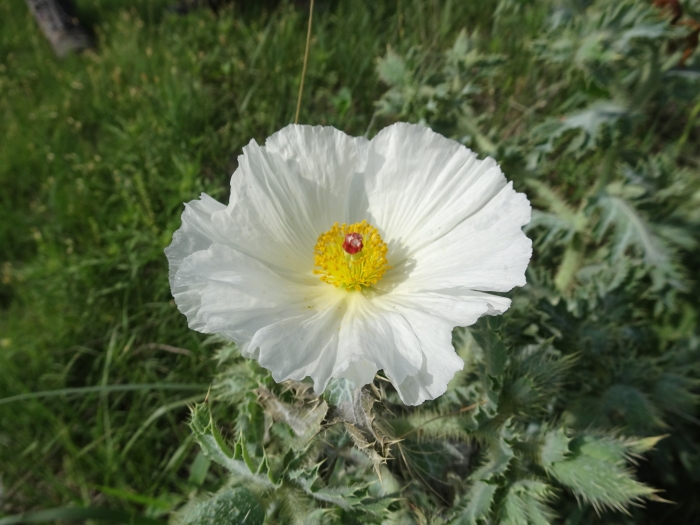Crested Pricklypoppy
(Argemone polyanthemos)
Crested Pricklypoppy (Argemone polyanthemos)
/
/

Thomas Koffel
CC BY 4.0
Image By:
Thomas Koffel
Recorded By:
Copyright:
CC BY 4.0
Copyright Notice:
Photo by: Thomas Koffel | License Type: CC BY 4.0 | License URL: http://creativecommons.org/licenses/by/4.0/ | Rights Holder: Thomas Koffel | Publisher: iNaturalist | Date Created: 2021-06-12T09:58:22-07:00 |



















Estimated Native Range
Summary
Argemone polyanthemos, commonly known as crested pricklypoppy, is an annual herb native to the Great Plains and the Intermountain West of the United States, including dry soils from Texas to North Dakota and west to Washington State. It has also naturalized in adjacent areas, primarily east of the Rocky Mountains. Crested pricklypoppy typically grows up to 4 feet tall with pale blue-green, deeply lobed leaves that are spiny and have a waxy coating, giving the plant a distinctive silver-blue appearance. The showy white flowers, blooming from late spring to summer, have 4-6 thin, white petals surrounding prominent yellow stamens, creating a stark contrast against the foliage. The plant produces a thick orange-yellow sap when cut, which, along with its prickly defenses, deters grazing animals.
Crested pricklypoppy is valued for its drought tolerance and long-lasting, showy blooms, making it suitable for xeriscaping and naturalistic plantings in arid regions. It thrives in full sun and is adaptable to a range of soil types, including sandy or gravelly soils with good drainage. While it is not commonly used in formal garden settings, its striking appearance can add interest to wildflower meadows and restoration projects. Gardeners should note that the sap contains alkaloids and can be toxic if ingested. Additionally, the plant’s self-seeding capability may lead to it spreading beyond its intended area, so care should be taken to manage its growth in cultivated landscapes.CC BY-SA 4.0
Crested pricklypoppy is valued for its drought tolerance and long-lasting, showy blooms, making it suitable for xeriscaping and naturalistic plantings in arid regions. It thrives in full sun and is adaptable to a range of soil types, including sandy or gravelly soils with good drainage. While it is not commonly used in formal garden settings, its striking appearance can add interest to wildflower meadows and restoration projects. Gardeners should note that the sap contains alkaloids and can be toxic if ingested. Additionally, the plant’s self-seeding capability may lead to it spreading beyond its intended area, so care should be taken to manage its growth in cultivated landscapes.CC BY-SA 4.0
Plant Description
- Plant Type: Herb
- Height: 1-3 feet
- Width: 1-1.75 feet
- Growth Rate: Rapid
- Flower Color: White
- Flowering Season: Spring, Summer, Fall
- Leaf Retention: Deciduous
Growth Requirements
- Sun: Full Sun, Part Shade
- Water: Low
- Drainage: Fast, Medium
Common Uses
Deer Resistant, Drought Tolerant, Low Maintenance, Rabbit Resistant
Natural Habitat
Native to the Great Plains and the Intermountain West of the United States
Other Names
Common Names: Bluestem Pricklepoppy, Annual Pricklypoppy, Bluestem Prickly Poppy, Plains Prickly-Poppy, Pricklypoppy, Thistle Poppy, White Prickly Poppy
Scientific Names: , Argemone polyanthemos, Argemone intermedia var. polyanthemos, Argemone intermedia var. polyanthemos, Argemone mexicana var. albiflora, Argemone polyanthemos f. rosea,
GBIF Accepted Name: